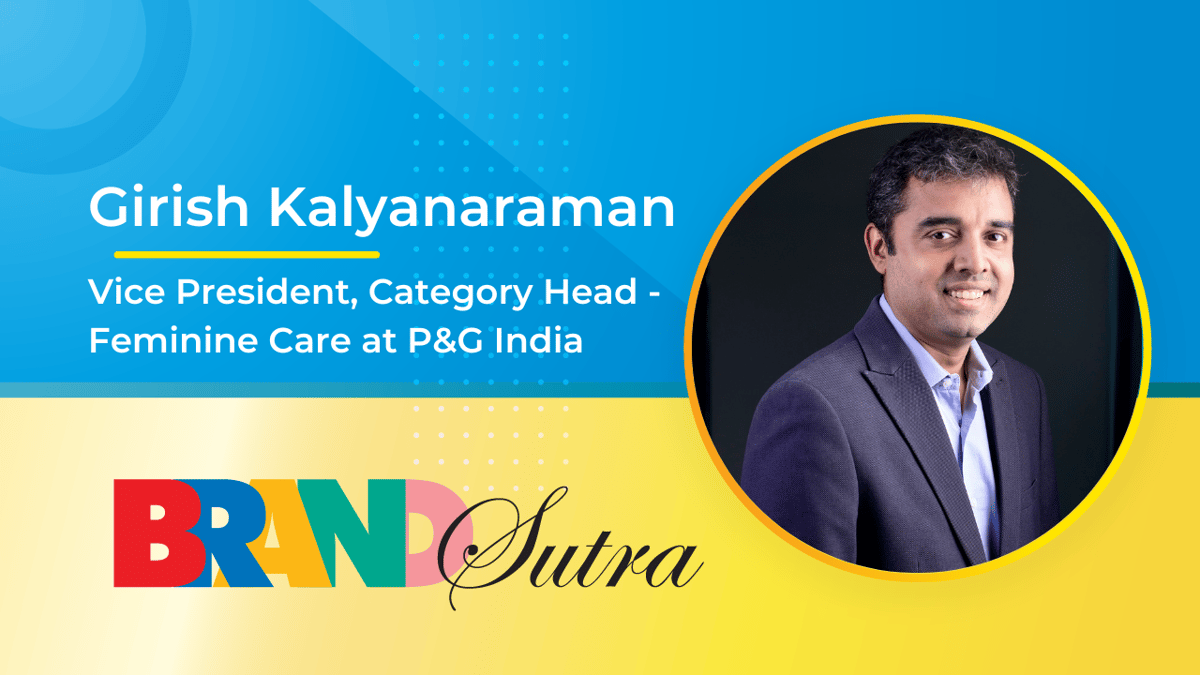Contrary to its name, Whisper has never been hush-hush about the subject of menstruation. Since entering the Indian market in 1989, the brand has been at the forefront of normalising conversations around periods, challenging deeply ingrained taboos and empowering women through impactful campaigns and innovative products, Girish Kalyanaraman, Vice President and Category Head of Feminine Care at Procter & Gamble India, tells us. By being the first to showcase sanitary pads on television and openly addressing the subject of menstruation, Whisper has revolutionised how Indian society approaches menstrual hygiene.
Pioneering Campaigns
When Whisper launched its first Indian television commercial in 1989, featuring actress Renuka Shahane, it marked a monumental shift in attitudes. At a time when even mentioning the word “period” was considered taboo, the campaign brought menstrual hygiene into mainstream media. The ad not only educated women about sanitary pads but also initiated a cultural conversation about menstrual health.
Over the decades, the brand has become synonymous with campaigns that challenge stereotypes and societal restrictions. The ‘Touch the Pickle’ campaign in 2015 directly addressed myths surrounding menstruation and encouraged women to challenge regressive norms. The campaign received global acclaim, including a Cannes Glass Lion Grand Prix, for its bold and impactful message.
Similarly, the 2017 ‘Sit Improper’ campaign urged women to reject conformist stereotypes and embrace their individuality, portraying menstruation as a natural and empowering aspect of life. Such initiatives have redefined the narrative around menstrual health, shifting it from one of secrecy and shame to one of empowerment and normalisation.
While urban India has made significant progress in accepting and discussing menstruation, rural areas continue to grapple with stigma and misinformation. Whisper’s ‘Keep Girls In School’ (KGIS) initiative has been instrumental in addressing these issues, providing menstrual education and free sanitary pads to over 100 million girls and mothers. This programme ensures that young girls do not miss school due to menstruation, combating the challenges of stigma and access.
Kalyanaraman highlights the importance of addressing grassroots challenges. “The biggest challenges of menstrual hygiene are awareness, acceptance, and access. Girls in India need to choose the right sanitary hygiene for themselves and move away from unsafe alternatives like cloth, ash, or sand,” he says.
The Indian menstrual hygiene market has expanded significantly over the last decade, evolving into an INR 8,500 crore industry. Despite this growth, rural penetration remains low, primarily due to economic barriers and societal stigma. Whisper has been a major driver of awareness and innovation in the industry, aiming to bridge these gaps.
According to Kalyanaraman, the preferences of Indian consumers are shifting towards openness, innovation and meaningful brand engagement. “The preferences of Indian consumers in the feminine care space are being shaped by a growing emphasis on open conversations, innovative solutions and meaningful brand engagement.” Whisper’s recent campaigns, featuring actress Ananya Panday, focus on normalising menstruation through relatable storytelling and digital platforms.
The brand’s philosophy of “Real Period, Real Solutions” reflects its commitment to addressing women’s actual needs. Its Whisper Ultra with Curvewear Technology, for instance, offers solutions to common challenges such as leaks and discomfort by designing a pad that contours to a woman’s body. This consumer-focused approach highlights the brand’s dedication to enhancing comfort and protection during menstruation.
The rise of new-age products such as menstrual cups and tampons, along with increased competition in the market, has fostered a more informed and open dialogue around menstrual hygiene. While this diversification presents challenges, it also aligns with Whisper’s mission of normalising discussions about periods and promoting safe hygiene practices.
“The increased number of brands and awareness only helps drive more conversations about the category and normalises the discussion,” says Kalyanaraman. They welcome the expanded dialogue as a step forward in breaking down societal taboos.
Whisper remains dedicated to breaking barriers and fostering empowerment through menstrual hygiene. Its focus on expanding access to quality menstrual products and education underpins its vision for the future. “We will continue to innovate with products that meet the evolving needs of women, ensuring they feel confident and comfortable throughout their periods,” says Kalyanaraman.
The ‘Keep Girls In School’ programme continues to play a pivotal role in this mission. Whisper’s recent KGIS campaign addressed early-onset menstruation, using engaging content to educate girls and boys alike about periods. Such initiatives reflect Whisper’s broader commitment to creating an inclusive and supportive environment for menstrual health.
Whisper’s journey in India has been transformative, challenging entrenched norms and reshaping societal perceptions about menstruation. By combining innovative products with groundbreaking campaigns and grassroots initiatives, the brand has established itself as a beacon of empowerment and progress in the menstrual hygiene space.
As Whisper looks to the future, its focus remains steadfast on driving innovation, expanding accessibility, and fostering a culture of acceptance. By addressing the unique challenges faced by women across urban and rural India, Whisper continues to lead the charge in turning menstrual hygiene from a taboo subject into a symbol of empowerment and confidence.
